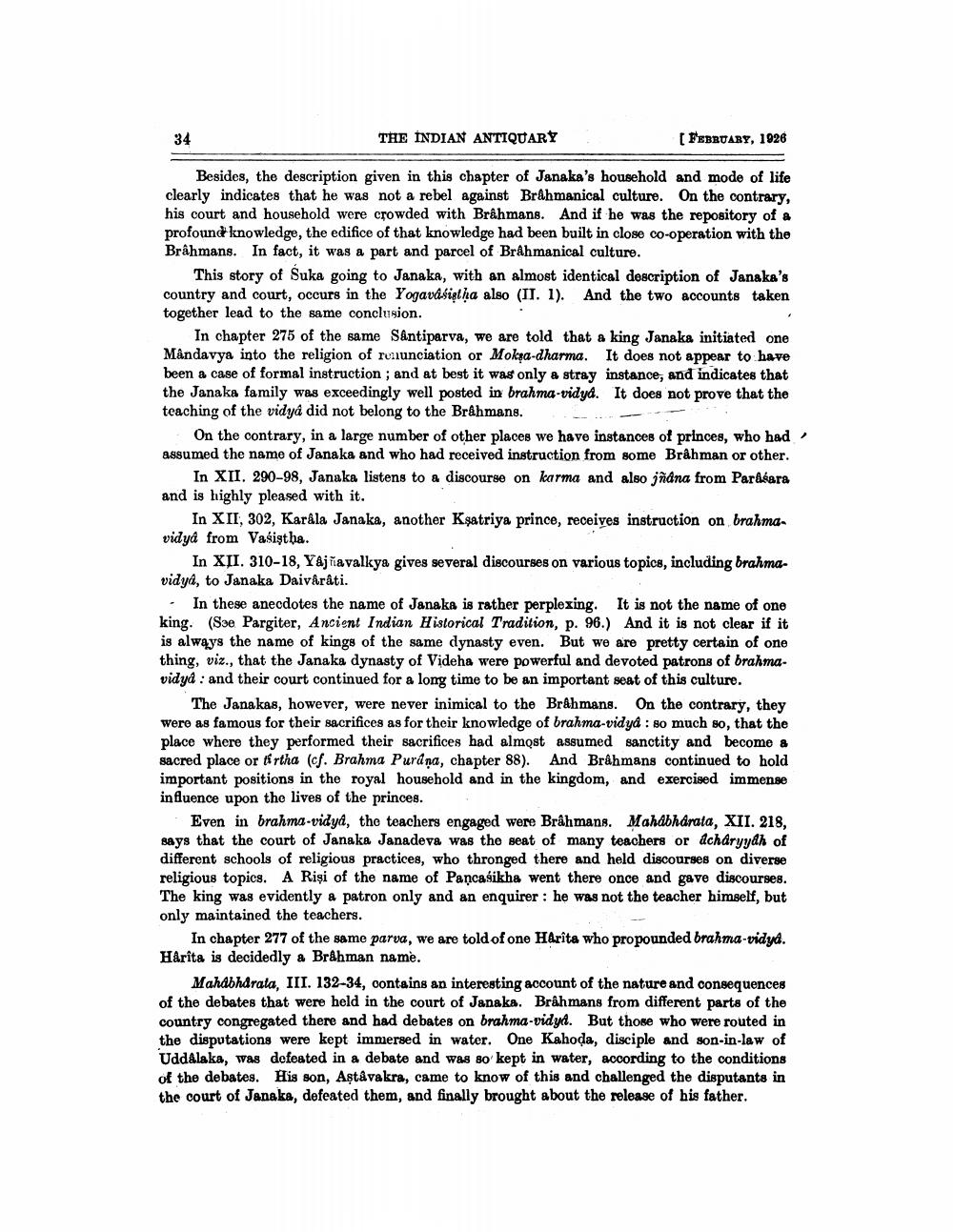________________
THE INDIAN ANTIQUARY
[ FEBRUABY, 1926
Besides, the description given in this chapter of Janaka's household and mode of life clearly indicates that he was not a rebel against Brahmanical culture. On the contrary, his court and household were crowded with Brâhmans. And if he was the repository of a profound knowledge, the edifice of that knowledge had been built in close co-operation with the Brâhmans. In fact, it was a part and parcel of Brahmanical culture.
This story of Suka going to Janaka, with an almost identical description of Janaka's country and court, occurs in the Yogavåsigtha also (II. 1). And the two accounts taken together lead to the same conclusion.
In chapter 275 of the same Santiparva, we are told that a king Janaka initiated one Mândavya into the religion of renunciation or Mokra-dharma. It does not appear to have been a case of formal instruction, and at best it was only a stray instance, and indicates that the Janaka family was exceedingly well posted in brahma-vidyd. It does not prove that the teaching of the vidyd did not belong to the Brahmans.
On the contrary, in a large number of other places we have instances of princes, who had assumed the name of Janaka and who had received instruction from some Brahman or other.
In XII. 290-98, Janaka listens to a discourse on karma and also jñana from Pardara and is highly pleased with it.
In XII, 302, Karála Janaka, another Ksatriya prince, receives instruction on brahmavidya from Vašiştha.
In XII. 310-18, Yajñavalkya gives several discourses on various topics, including brahmavidya, to Janaka Daivåråti.
• In these anecdotes the name of Janaka is rather perplexing. It is not the name of one king. (Soe Pargiter, Ancient Indian Historical Tradition, p. 96.) And it is not clear if it is always the name of kings of the same dynasty even. But we are pretty certain of one thing, viz., that the Janaka dynasty of Videha were powerful and devoted patrons of brahmavidya : and their court continued for a long time to be an important seat of this culture.
The Janakas, however, were never inimical to the Brahmans. On the contrary, they were as famous for their sacrifices as for their knowledge of brahma-vidya : so much so, that the place where they performed their sacrifices had almost assumed sanctity and become a sacred place or tirtha (cf. Brahma Purana, chapter 88). And Bråhmans continued to hold important positions in the royal household and in the kingdom, and exercised immense influence upon the lives of the princes.
Even in brahma-vidya, the teachers engaged were Brahmans. Mahabharata, XII. 218, says that the court of Janaka Janadeva was the seat of many teachers or acharyydh of different schools of religious practices, who thronged there and held discourses on diverse religious topics. A Rişi of the name of Pancasikha went there once and gave discourses. The king was evidently a patron only and an enquirer : he was not the teacher himself, but only maintained the teachers.
In chapter 277 of the same parva, we are told of one Harita who propounded brahma-vidyd. Hårîta is decidedly a Bråhman name.
Mahabharata, III. 132-34, contains an interesting account of the nature and consequences of the debates that were held in the court of Janaka. Brahmans from different parts of the country congregated there and had debates on brahma-vidya. But those who were routed in the disputations were kept immersed in water. One Kahoda, disciple and son-in-law of Uddalaka, was defeated in a debate and was so kept in water, according to the conditions of the debates. His son, Aştåvakra, came to know of this and challenged the disputants in the court of Janaka, defeated them, and finally brought about the release of his father.




